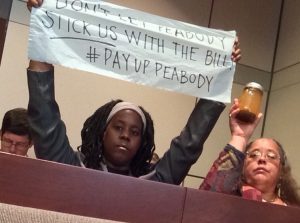
By CARL GREEN
Illinois Correspondent
St. Louis – With protesters looking on, the Peabody Energy retirees’ pension and health-care watch took a turn for the worse recently as a bankruptcy judge approved the company’s request to spend up to $11.9 million on executive bonuses, while the company has not yet filed its bankruptcy plan.
In addition, the judge approved company commitments totaling $176 million to three states in case Peabody fails to complete mine cleanup obligations.
Protesters were watching from the gallery as federal bankruptcy judge Barry Schermer approved Peabody’s request to pay up to $11.9 million in bonuses to six top executives, including $2.868 million to Glenn Kellow, the chief executive.
Other recipients are Amy Schwetz, chief financial officer; A. Verona Dorch, chief legal officer; Charles Meintjes, Australian division president; Kemal Williamson, American division president; and Bryan Gally, marketing and trading executive.
To receive the bonuses, the executives will have to improve the company’s financial performance while meeting safety, environmental and restructuring goals. The company said giving the executives incentives will be good for all of its creditors by “maximizing” the company’s value.
The judge earlier approved up to $3.24 million in bonuses designed to keep 42 of its professional and office workers from leaving.
 Peabody filed for bankruptcy in April, saying it owed $10 billion in a faltering coal market.
Peabody filed for bankruptcy in April, saying it owed $10 billion in a faltering coal market.
Peabody also faces up to $1.14 billion in potential environmental liabilities. Under the plan approved Wednesday, Wyoming would receive $127 million in cash, New Mexico $32 million and Indiana $17 million if the company “walks away” from its cleanup obligations.
Those liabilities are the result of “self-bonding,” a federal program that allows companies to mine coal without setting aside clean-up funds or collateral.
THE WATCHERS
The protesters were members of Pay Up Peabody, a coalition of groups representing communities with environmental concerns, retirees and Native Americans displaced by mining, seeking what they call a “Just Transition Fund” out of the bankruptcy case.
One of their signs at the hearing read: “We demand a just transition to a new economy where $11.9 million goes toward reparations, reclamation, worker pensions and health care rather than the pockets of six Peabody executives in the form of bonuses.”
They also brought a sample of brown, polluted water from a Peabody mine in southern Illinois.
Amy Chen, a student and St. Louis resident, was among the Pay Up activists.
 “Today the courtroom was unwelcoming toward regular people – anyone not in a suit,” she said after the hearing. “Decisions made in Schermer’s courtroom have grave impact over our lives, livelihoods and the land on which we live. In this courtroom, it seemed to already be decided which side the law is on. We need a justice system that doesn’t just serve corporate interests, we need one that is accessible to the voices of those most impacted.”
“Today the courtroom was unwelcoming toward regular people – anyone not in a suit,” she said after the hearing. “Decisions made in Schermer’s courtroom have grave impact over our lives, livelihoods and the land on which we live. In this courtroom, it seemed to already be decided which side the law is on. We need a justice system that doesn’t just serve corporate interests, we need one that is accessible to the voices of those most impacted.”
The group’s goals for the bankruptcy include:
- Fully funding pensions and health care plans for Peabody and Patriot coal workers.
- Stopping forcible relocation and harassment of Dine´ (Navajo) people in Arizona, with reparations.
- Full funding for cleanup and reclamation of mined lands and polluted and depleted aquifers.
- Prioritizing communities damaged by Peabody’s mining practices over executives and investors.
“We’re through with that dirty old game where a big coal company uses powerful local institutions and people to prop itself up,” said protester Basmin Nadra of St. Louis. “We won’t sit quietly while the legal system protects the interests of a wealthy few over the well-being of our families. It’s time for us to recognize we are all connected in these concerns. This is an opportunity to set new precedents.”

